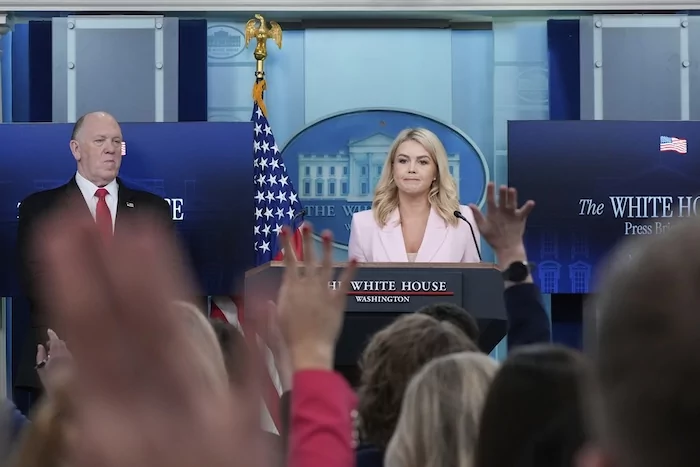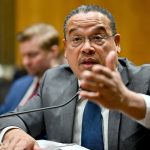Just one day shy of President Donald Trump’s 100th day in office, top Trump administration officials claimed victory on myriad border and immigration-related promises that Trump made to voters as a candidate.
White House press secretary Karoline Leavitt touted Trump’s accomplishments during an unusually early morning press conference with reporters at the White House on Monday.
“One of President Trump’s central campaign promises was to secure the border and end this invasion in just under 100 days. 99 now, to be exact,” Leavitt said. “The president has overwhelmingly delivered on that promise. America’s borders are now secure because of President Trump.”
White House border czar Tom Homan joined Leavitt at the White House and reiterated the ways that the Trump administration has made the country safer by reducing illegal immigration at the southern border and launching a mass deportation operation aimed at those unlawfully in the country.
1. Border wall construction and whether Mexico will pay for it
Leavitt announced that 85 miles of border wall construction were in the planning and construction stages.
“The president has also restarted construction of the signature advanced border wall,” she said. “Border Patrol, in collaboration with the Department of Defense and the great state of Texas, have deployed 75 additional miles of temporary barriers across the southern border.”
In 2016, Trump vowed as a candidate to build a 1,000-mile wall on the nearly 2,000-mile border, stretching from the Pacific Coast in California to the Gulf of Mexico in Texas. He also said he would do it for $4 billion and that Mexico would pay for it.
That second promise was one he did not mention during his 2024 presidential run, but one reporter in the press briefing Monday asked if Mexico had fronted the money for the wall in his second term.
“They have in a round-about way, have they not?” Homan said of Mexico’s payment, “Putting 10,000 military on the northern, southern border. Taking action … [Has] moved illegal immigration to a record low. We’re saving millions of dollars every day on detention, transportation, removal proceedings. We’ve more than made up for the cost of that wall because of the actions of Mexico.”
During the first term, Congress appropriated $15 billion to fund 738 miles of border wall in addition to money the Trump administration redirected from the Departments of Defense and Treasury. By the time Trump left office in January 2021, 450 miles of the 738 in funded miles were completed.
2. Why the national emergency is still in place
One reporter asked if the national emergency declared on Day One was still in effect after federal data showed arrests of illegal immigrants had dropped to a record low in March.
“It’s an emergency until the cartels are wiped off the face of this Earth,” Homan said. “This is the biggest national security failure this country has ever seen. This is a border emergency until we end it, end all of it. We’re making good strides right now. It’s still an emergency till we shut it down.”
Arrests of illegal immigrants have declined significantly, from well over 100,000 in nearly every month during the Biden administration to less than 8,000 arrests in March.
The Trump administration declared a national emergency at the border on Jan. 20. The action allowed the Defense Department to deploy active-duty and National Guard military to the southern border, erect barriers, and work on ways to take down enemy drones.
However, the White House has also imposed tariffs against Canada and Mexico over the smuggling of fentanyl into the United States from both countries.
3. US citizen children were not deported
Recent instances where U.S. citizen children who left the country with an illegal immigrant parent were the result of the parents’ decisions to be deported with their offspring rather than leave the child behind, according to Leavitt.
Three children from two families were removed with their mothers last week, prompting blowback from some media under the impression that the Trump administration was removing U.S. citizens from the country.
“I said from Day One, if you enter this country illegally, it’s a crime. If you remain in this country illegally and you ignore a judge’s order about deporting, if you choose to have a citizen child, knowing you’re in this country illegally, you put yourself in that position. You put your family in that position,” said Homan.
“What we did is remove children with their mothers who requested the children depart with them. This is a parental decision,” Homan continued. “The mothers made that choice. And I tell you, what? [If] we didn’t do it, the story today would be, ‘Trump administration separating families again.’ No, we’re keeping families together. So when a parent says, ‘I want that, I want my two-year-old baby to go with me,’ we made that happen.”
Secretary of State Marco Rubio also defended the Trump administration when asked about why the three U.S. citizen children had departed.
“Three U.S. citizens, ages four, seven, and two, were not deported. Their mothers, who were illegally in this country, were deported. The children went with their mothers,” Rubio said during an appearance on NBC News’s Meet the Press Sunday. “You guys make it sound like [Immigration and Customs Enforcement] agents kicked down the door and grabbed the two-year-old and threw them on an airplane. That’s misleading. That’s just not true.”
4. Status of Kilmar Abrego Garcia
More than one month after the Trump administration deported Salvadoran national Kilmar Abrego Garcia to El Salvador, where he and 237 other Venezuelan and Salvadorans were moved into a mega prison, the White House said there were no new talks about bringing Abrego Garcia back to the U.S.
“I will tell you what the president of El Salvador told all of you in the Oval Office. El Salvador does not intend to smuggle a designated foreign terrorist back into the United States. He is an El Salvadorian national. That is his home country, that is where he belongs,” Leavitt said. “The administration intends to comply with what President [Nayib] Bukele said of El Salvador. He does not intend to send that individual, that individual back.”
Abrego Garcia was mistakenly flown out of the country in mid-March after Trump invoked the Alien Enemies Act as grounds to deport illegal immigrants with terrorism affiliations swiftly. Under the act, immigrants do not have to undergo due process and can be deported without a final appearance before a judge.
In Abrego Garcia’s case, the Justice Department admitted that he was wrongly removed because a judge in 2019 had issued a “withholding order” that prevented his deportation to El Salvador over fear for his safety. Courts have ordered the U.S. government to facilitate his return to the U.S, but the Trump administration has refused to do so.

5. Executive order on sanctuary cities and states
Trump is slated to sign two executive orders this evening, one on law and order and a second on sanctuary cities. The signings will bring Trump’s total executive actions since taking office to more than 140, including 50 of which that were immigration-focused.
“The first [executive order] will strengthen and unleash America’s law enforcement to pursue criminals and protect innocent citizens,” said Leavitt. “The second [executive order] is centered around protecting American communities from criminal aliens, and it will direct the attorney general and secretary of Homeland Security to publish a list of state and local jurisdictions that obstruct the enforcement of federal immigration laws.”
The Trump administration’s decision to publish a list of sanctuary jurisdictions in the country comes days after it was dealt a blow in court while trying to rein in their authority.
A federal judge in California ruled on April 24 that the Trump administration could not deny federal funds to sanctuary cities, and that part of Trump’s executive order on the issue went against the Constitution.
RASHIDA TLAIB SAYS TRUMP ADMINISTRATION IS ‘DISAPPEARING’ PEOPLE AT THE NORTHERN BORDER
Former President Barack Obama appointee U.S. District Court Judge William Orrick wrote that the government was barred “from directly or indirectly taking any action to withhold, freeze, or condition federal funds.
San Francisco filed the lawsuits in February on behalf of more than a dozen cities that sued because Washington was illegally attempting to force their jurisdictions to cooperate with federal immigration authorities.























